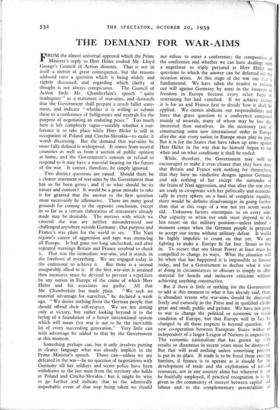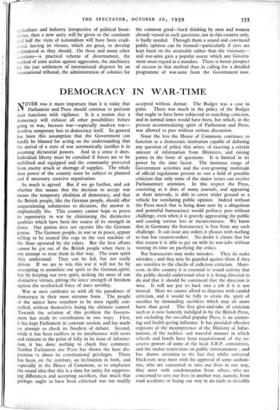THE DEMAND FOR WAR-AIMS
lp ROM the almost universal approval which the Prime Minister's reply to Herr Hitler evoked Mr. Lloyd George's Council of Action dissents. That is not in itself a matter of great consequence, but the reasons adduced raise a question which is being widely and rightly discussed, and regarding which clarity of thought is not always conspicuous. The Council of Action finds Mr. Chamberlain's speech "quite inadequate" as a statement of war-aims, and demands that the Government shall prepare a much fuller state- ment, and indicate "whether it is willing to submit these to a conference of belligerents and neutrals for the purpose of negotiating an enduring peace." Too much here is left completely vague—notably whether a con- ference is to take place while Herr Hitler is still in occupation of Poland and Czecho-Slovakia—to make it worth discussing. But the demand that war-aims be more fully defined is widespread. It comes from neutral countries as well as from a section of public opinion at home, and the Government's consent or refusal to respond to it may have a material bearing on the future of the war. It cannot, therefore, be simply ignored.
Two distinct questions are raised. Should there be a clearer statement of war-aims by the Government than has so far been given ; and if so what should be its nature and content? It would be a great mistake to take it for granted that the answer to the first question must necessarily be affirmative. There are many good grounds for coming to the opposite conclusion, except in so far as a certain elaboration of statements already made may be desirable. The motives with which we entered the war are neither misunderstood nor challenged anywhere outside Germany. Our purpose and France's was plain for the world to see. The Nazi regime's career of aggression and rape was menacing all Europe. It had gone too long unchecked, and after repeated warnings Britain and France resolved to check it. That was the immediate war-aim, and it stands in the forefront of everything. We are engaged today in the endeavour to achieve it. But there is a second inseparably allied to it. If the first war-aim is attained then measures must be devised to prevent a repetition by any nation in Europe of the crime of which Herr Hitler and his associates are guilty. All that Mr. Chamberlain has made plain. "We seek no material advantage for ourselves," he declared a week ago. "We desire nothing from the German people that should offend their self-respect. We are not aiming only at victory, but rather looking beyond it to the laying of a foundation of a better international system which will mean that war is not to be the inevitable lot of every succeeding generation." Very little can with advantage be added to that by the Government at this moment.
Something perhaps can, but it only involves putting in clearer language what was already implicit in the Prime Minister's speech. There can—unless we are defeated in the war—be no question of negotiations with Germany till her soldiers and secret police have been withdrawn to the last man from the territory she holds in Poland and Czecho-Slovakia ; but it might be wise to go further and indicate that in the admittedly improbable event of that step being taken we should not refuse to enter a conference; the composition 01 the conference and whether we can have dealings with a negotiator so triply perjured as Herr Hitler arc questions to which the answer can be deferred till the occasion arises. At this stage of the war one fact fundamental. We have taken the resolve to enforce our will against Germany by arms in the interests ot freedom in Europe because every other hope of restraining her had vanished. If we achieve victory it is for us and France first to decide how it shall b'e applied. We cannot abdicate our responsibilities and leave that grave question to a conference compose:t mainly of neutrals, many of whom may be less dis- interested than ourselves. In the necessary task of constructing some new international order in Europe after the war every nation in Europe must play its part But it is for the States that have taken up arms against Herr Hitler in the war that he himself began to sal when and on what conditions it shall be ended.
While, therefore, the Government may well be encouraged to make it even clearer than they have done that Britain and France seek nothing for themselves, that they have no vindictive designs against Germany and ask nothing of her except the surrender of the fruits of Nazi aggression, and that after the war they are ready to co-operate with her politically and economi- cally in every sphere on a basis of complete equality, there would be definite disadvantages in going further than that at this stage of a war not yet seven weeks old. Unknown factors encompass us on every side. Our capacity to attain our ends must depend in thc last resort on the military position—unless indeed a moment comes when the German people is prepared to accept our terms without military defeat. It would be highly impolitic to count on that yet. We are fighting to make a Europe fit for free States to live in. To secure that one Great Power at least must be compelled to change its ways. What the situation will be when that has happened it is impossible to foresee today, and for a Government to declare what it aim at doing in circumstances so obscure is simply to offer material for hostile and insincere criticism without achieving anything constructive.
But if there is little or nothing for the Government to add at this moment to what it has already said, there is abundant reason why war-aims should be discussed freely and earnestly in the Press and in qualified circles great and small, public and private. We have not gone to war to change the political or economic or social condition of Europe, but that Europe will in fact be changed in all those respects is beyond question. A new co-operation between European States within. or independent of a larger League of Nations is imperative. The economic nationalism that has grown up with results so disastrous in recent years must be destroyed. But that will avail .nothing unless something positive is put in its place. If trade is to be freed from existing barriers, if finance is to operate as it should for the development of trade and the exploitation of nat aral resources, not in one country alone but wherever it can be fruitfully employed, if practical recognition is to be given to the community of interest between capital and labour and to the complementary potentialities or agriculture and industry irrespective of political boun- daries, then a new unity will be given to the continent and half the vices of nationalism will have been eradi- cated, leaving its virtues, which are great, to develop unhindered as they should. On these and many other q uestions—a practical scheme of disarmament, the method of joint action against aggression, the machinery for the just settlement of international disputes by an international tribunal, the administration of colonies for the common good—hard thinking by men and women already versed in such questions, not in this country only, is badly needed. Through them a sound and convinced public opinion can be formed—particularly if eyes are kept fixed on the attainable rather than the visionary— and war-aims gain a popular assent which any Govern- ment must regard as a mandate. There is better prospect of success in that method than in calling for a detailed programme of war-aims from the Government now.













































 Previous page
Previous page